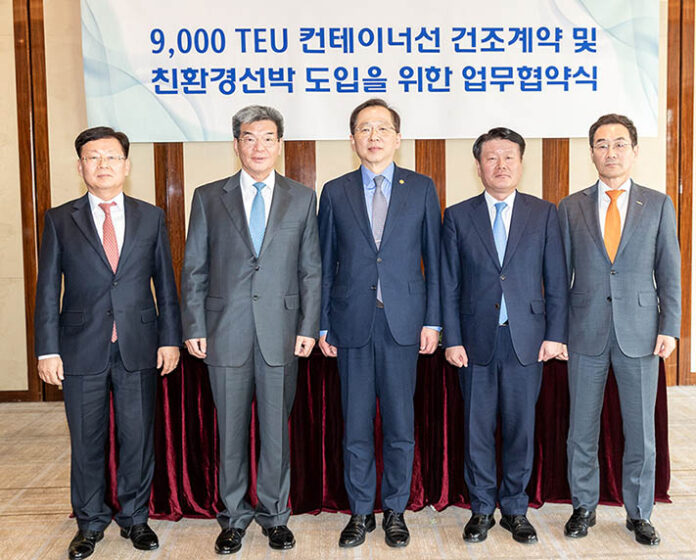
-
HMM signed newbuilding contracts with Hyundai Samho Heavy Industries and HJ Shipbuilding and Construction for nine containerships powered by methanol dual-fuel engines
-
HSHI and HJSC will build seven and two vessels, respectively, worth total of $1.12 billion
-
Each of the 9,000 twenty-equivalent unit ships are to be deployed on the Asia-North/Latin America trade lanes and the Asia-India routes
-
Expected delivery is from 2025 to 2026
-
HMM also signed an MOU with five suppliers to secure supply of methanol for its newly-ordered vessels
HMM has signed newbuilding contracts with Hyundai Samho Heavy Industries (HSHI) and HJ Shipbuilding and Construction (HJSC) for nine containerships powered by methanol dual-fuel engines.
Under the agreement, HSHI and HJSC will build seven and two vessels, respectively, costing a total of $1.12 billion, HMM said in a statement.
The 9,000 twenty-equivalent unit ships are scheduled to be deployed on the Asia-North/Latin America trade lanes and the Asia-India routes, with expected delivery from 2025 to 2026.
Green shipping corridors between Busan in Korea and key ports in the US are also one of the potential routes to operate the new ships.
With the order of methanol-powered containerships, HMM has taken an initial step toward expanding its eco-friendly fleet using alternative fuels.
Methanol significantly reduces greenhouse gas emissions compared to conventional oil-based fuels, bringing an immediate improvement in air quality around ports and shipping lanes. Sulphur oxides and particulate matter emissions are virtually eliminated and nitrogen oxides emissions are cut by 80%.
Furthermore, methanol’s biodegradable and water-soluble qualities significantly reduce the risk to marine environments.
HMM also signed a memorandum of understanding with five fuel suppliers, including Proman, PTTEP, European Energy, and Hyundai Corp, to secure the supply of methanol for its newly-ordered vessels.
HMM will conduct a feasibility study with each partner to procure various types of methanol in its main bunkering ports and, subsequently, will collaborate to produce green methanol as part of developing carbon-neutral fuels.
HMM has committed to reaching net-zero carbon emissions across its fleet by 2050. To achieve the target, HMM is exploring a range of sustainable energy sources, including methanol, LNG, hydrogen, and green ammonia.
“We will continue to drive efforts to support the global community’s broader transition to carbon neutrality while at the same time strengthening our fundamental level of future capability in the face of increasingly fierce competition in the global market.” said HMM president and CEO Kim Kyung Bae.
RELATED READ: HMM staying on course after strong 2022 results




